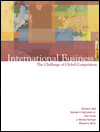Realize that the currencies of countries change in value in terms of each other.
Currency exchange rates, the cost of one currency in terms of others, fluctuate constantly. Understand how currency value changes affect international business transactions.
Anyone who has the obligation to pay or the right to receive a foreign currency in the future has a currency exchange risk. The risk may arise out of transactions (e.g., export or import contracts, in which case it is called a transaction risk). Or it may arise out of longer-term investments that are the subjects of financial statements, in which case it is called a translation risk. Recognize the tremendous importance of financial management to an international company (IC).
Financial management is vital to the success of ICs and has moved from being merely a service to being a profit center. Know about financial management tools.
Financial management tools include derivatives, hedges, payment timing, exposure netting, price adjustments, balance sheet neutralizing, and swaps. Understand the growing use of derivatives as hedging devices.
Derivative hedges include such devices as forward, future, and credit hedges. Explain how financial executives meet, network, and cooperate with their counterparts in other organizations to protect and/or benefit their organizations in derivatives operations.
Financial management conferences are held frequently in cities around the world. At them, the financial executives can meet or become aware of their counterparts from other organizations with whom to cooperate. Understand why exporters sometimes accept payment in forms other than money.
Buyers frequently don’t have or don’t want to use hard, convertible currency and wish to pay in goods or services instead of money. The generic term for this is countertrade. Differentiate between hard, convertible currencies and soft, nonconvertible ones.
Hard, convertible currencies are accepted all around the world at uniform exchange rates. Soft, nonconvertible currencies are rarely of any use outside the country of issue. Explain the growing importance of international finance centers to ICs.
An IC’s international finance center accumulates the expertise and information to transact all international financial dealings of all the IC’s units most profitably and at lowest cost. | 



 2002 McGraw-Hill Higher Education
2002 McGraw-Hill Higher Education